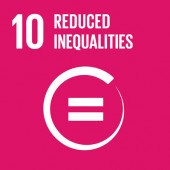Reducing Inequalities
SANNE KRUID (YOUNG PROFESSIONAL)
SUSTAINABLE DEVELOPMENT GOAL 10:
Dring ongelijkheid in en tussen landen terug
https://unric.org/nl/sdg-10
For me, reducing inequalities is one of the most difficult and most interesting goals from the SDGs because it is hard to find a clear definition of what exactly inequalities are. In my opinion it is important to realize that reducing inequalities is not just about the wealthy helping the poor, but goes far beyond that. It is about bringing the wealthy and the poor together; not just income or capital wise, but also mind, education and opportunity wise; about creating a common understanding between those people. This is important because only then will both the poor and the wealthy see one another as real human beings, instead of bogeymen. Otherwise, the wealthy may see the poor solely as a reason why they need to pay more taxes, while poor people may think that the wealthy are all egoistic.
Within the Netherlands
According to research by the Rabobank (Badir, 2015), the inequality gap in the Netherlands is not very pressing compared to that of other European countries. Badir (2015), states that this is mainly due to its excellent education and healthcare system. Nevertheless, there are clues that the gap in income inequality will grow in coming decennia (Badir, 2015).
It is likely that the current gap between rich and poor is barely noticed within the Netherlands. This is partly because most people surround themselves with people from a similar socio-economic status. To see the inequalities one needs to get in touch with people from different socio-economic backgrounds; to talk with them, and not about them.
Between the Netherlands and Other Countries
In my opinion, inequalities between the Netherlands and other countries are more pressing than those within the Netherlands. Differences in cultures, languages, political systems and in views on what should be developed make international inequalities very hard to tackle. The western view of what needs to be developed often differs from the actual needs of the locals and too often the locals end up with things they do not want or need. Besides that, development aid should be focused on building local economies, empowering and making people and countries ever less dependent on ‘the rich west’.
For example, when locals in a certain less-developed country decide that they need a new school, we could send experts who can share their knowledge and skills on how schools can best be build within their cultural preferences, instead of sending western volunteers to build the school. This will improve the local economy, and empower people and is therefore a lot more sustainable than just providing them with a school.
Overall, if you want to reduce inequalities internationally, make sure that you do some research on what kind of projects you support. Choose local ones that are based on long-term development instead of short-term aid.
And Beyond
Overall, many wealthy people think that they deserve their wealth because they have worked hard for it, and they often think that if others work just as hard, they too would be able to attain similar wealth. Unfortunately, this capitalist idea does not work for most people; people who do work very hard, but are still relatively poor. In general it is often just a matter of good or bad luck whether you are wealthy or not, as it is highly dependent on where you were born and in what environment you grew up. One should realize that many people are not that lucky. In my opinion this realization is a way towards a felt-sense of equality; understanding that basically we are the same, but one has had more luck growing up or living in different circumstances than the other.
I think that the seven targets that the UN stated on inequalities do not cover all of them because inequalities are deeply rooted in societies.
At the heart of equality is treating each other as being equals, which means that one needs to get rid of the stereotypes and judgments over people who are different in terms of wealth, culture, skin colour or sexual preference. In order to be able to do that, one needs to get in touch with people who are different, and approach them without judgment. Put yourselves in the other’s shoes. What would I do if I were in his or her place?
So, what can you do? Start the conversation, get in touch with people from different backgrounds, put yourselves in the others’ shoes and be empathic. Do you want to go beyond that? Ask less wealthy people what they want or need and be honest about what your needs are if you are less wealthy. Together we can work to bridge the gap. It doesn’t sound too hard, does it?
BSc student Applied Communications Sciences, Wageningen University
